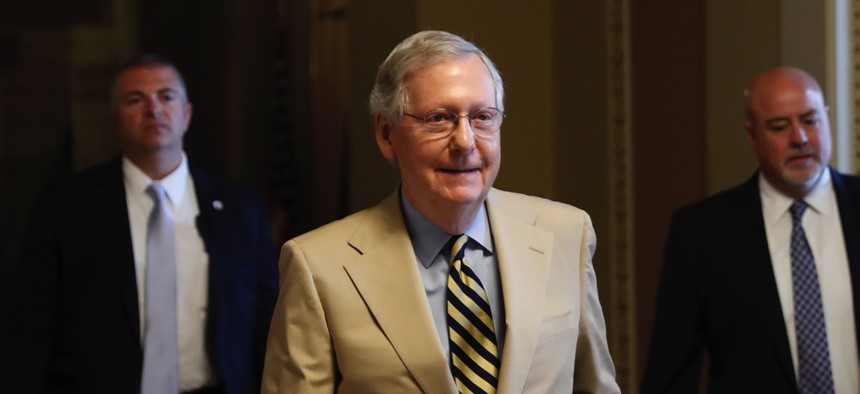Health Bill Updates: The Senate’s Better Care Reconciliation Act Gets a CBO Score; NGA Says Slow Down

(AP Photo/Carolyn Kaster)
Monday was a busy day for the health reform debate on Capitol Hill and in state capitals.
WASHINGTON — The Congressional Budget Office has offered its verdict on the Better Care Reconciliation Act, the U.S. Senate’s health care bill.
On the coverage front, the legislation offers scant improvement from the version of the bill passed by the House in May. Over the next decade, 22 million fewer people will have health insurance under this bill as compared with current legislation, according to the CBO report released Monday. Fifteen million of those people would already be without coverage by 2018.
Likewise, the Senate bill is still expected to reduce federal spending on Medicaid by as much as $772 billion.
The bill does offer an improved outlook on the deficit. Over the next 10 years, the BCRA is estimated to reduce the cumulative federal deficit by $321 billion—that’s compared with the $119 billion deficit reduction that the CBO identified for the House health bill.
Six-month Waiting Period
One late policy addition to the BCRA did not make it into the CBO’s analysis. Early Monday afternoon Republican leaders in the Senate altered the bill to penalize people who allow their coverage to lapse. Those who go without coverage for more than 63 days would have to wait six months before they’re eligible once again for new coverage. The waiting period is essentially a deterrent mechanism meant to discourage healthy people from waiting until they’re sick to sign up for health insurance.
Republicans in the Senate are determined to repeal the Affordable Care Act’s individual mandate—by far the most unpopular aspect of the current law—but without a policy in place to incentivize continuous coverage for healthy people, experts cautioned that the Senate’s bill risked creating what is often referred to as a “death spiral.”
Health insurance markets need both healthy and sick consumers to operate. The healthier—read: cheaper to insure—consumers subsidize the higher cost of providing health insurance to sicker patients. An inadequate number of healthy people in the market means the cost of health goes up. That in turn causes even more healthy people to opt out of buying coverage. The “death spiral” occurs because the healthiest people in the group—those that can manage to go without insurance—will keep dropping out as costs go up and up until only the sickest members of the population remain at increasingly high premium costs.
National Governors Association Says Slow Down
On top of the Monday news from the Congressional Budget Office, the National Governors Association is also adding its voice to the health care fray. In an open letter addressed to Senate Majority Leader Mitch McConnell, Virginia Gov. Terry McAuliffe, a Democrat, and Massachusetts Gov. Charlie Baker, a Republican, aired their procedural concerns with how the Senate is handling the legislation:
As Chief Executives of our states, we have an obligation to protect the health and welfare of our citizens. The nation’s governors are ready to work with leaders in Washington to make health care more accessible and affordable to the people we serve. However, governors must be given adequate time to determine the impact any health care bill will have on their states and residents, and ensure that the bill does not adversely harm the people we were elected to serve.
In short, the Senate is moving too fast for the country’s governors. It might indeed be a very quick turnaround if McConnell gets his wish. The Senate majority leader is hoping to call for a vote before the July 4 recess, but if any more Republicans come out in opposition to the bill that plan might change.
You can read the full letter from Baker and McAuliffe here.
Quinn Libson is a Staff Correspondent for Government Executive’s Route Fifty based in Washington, D.C.
NEXT STORY: Florida Is ‘Ground Zero’ for Hijacked Google Searches for Drug Treatment Centers






